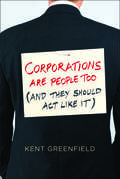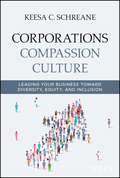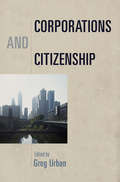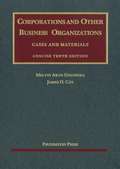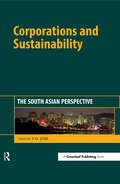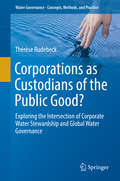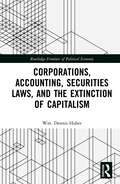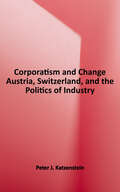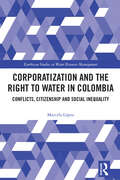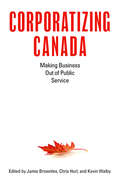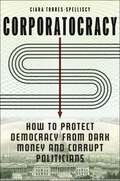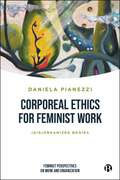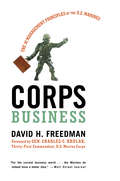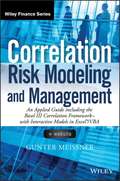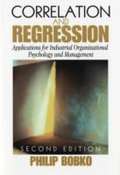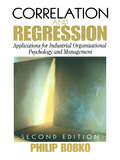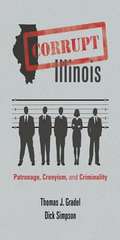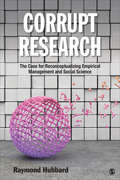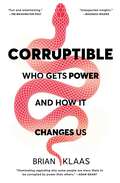- Table View
- List View
Corporations Are People Too: (And They Should Act Like It)
by Kent GreenfieldWhy we’re better off treating corporations as people under the law—and making them behave like citizens Are corporations people? The U.S. Supreme Court launched a heated debate when it ruled in Citizens United that corporations can claim the same free speech rights as humans. Should corporations be able to claim rights of free speech, religious conscience, and due process? Kent Greenfield provides an answer: Sometimes. With an analysis sure to challenge the assumptions of both progressives and conservatives, Greenfield explores corporations' claims to constitutional rights and the foundational conflicts about their obligations in society. He argues that a blanket opposition to corporate personhood is misguided, since it is consistent with both the purpose of corporations and the Constitution itself that corporations can claim rights at least some of the time. The problem with Citizens United is not that corporations have a right to speak, but for whom they speak. The solution is not to end corporate personhood but to require corporations to act more like citizens.
Corporations Compassion Culture: Leading Your Business toward Diversity, Equity, and Inclusion
by Keesa C. SchreaneThe manner in which corporations are run globally is over. The author examines how corporations worldwide have failed when it comes to inclusion and gender equality and provides ideas on how businesses can address these issues. This book will discuss the following: Identify behaviors to avoid, including dangerous activities pre-Covid-19 corporate America was already presenting to employees’ well-being, engagement, and productivity. Lack of inclusion, gender inequity, and overall lack of compassion were destroying workers’ quality of service and robbing employees of purpose. Readers learn how to dismantle practices that jeopardize corporations’ very survival. Learn and adopt approaches exhibiting the new, better corporate America that enriches employees and provides profits to businesses. The leaders who recognize that employees, customers, and shareholders should be treated compassionately and equally are now displacing old leaders, and are succeeding in retaining the best talent and surviving the new realities. Topics examined include what works well, what the sacrifices are, and how to see tremendous financial payoff. Create strategies and tactics for integrating inclusion, gender equity, and compassion into businesses in a way that enriches society, employees, and the corporate entities themselves. Companies that value inclusion, equity, and compassion also see loyalty and innovation from their employees, and skyrocketing profits. Readers learn to design better businesses for employees who demand better environments, and for shareholders who demand corporate stability, risk mitigation (especially in unstable times), and solid profits. Measure and continuously evolve culture promoting risk mitigation, reputation preservation, employee retention, customer satisfaction, and profit generation. Each concept discussed ties back into practicing and improving these elements.
Corporations and American Democracy
by William J. Novak Naomi R. LamoreauxRecent Supreme Court decisions in Citizens United and other high-profile cases have sparked disagreement about the role of corporations in American democracy. Bringing together scholars of history, law, and political science, Corporations and American Democracy provides essential grounding for today’s policy debates.
Corporations and Citizenship
by Greg UrbanPresident Theodore Roosevelt once proclaimed, "Great corporations exist only because they are created and safeguarded by our institutions, and it is therefore our right and duty to see that they work in harmony with those institutions. " But while corporations are ostensibly regulated by citizens through their governments, the firms in turn regulate many aspects of social and political life for individuals beyond their own employees and the communities that support them. Corporations are endowed with many of the same rights as citizens, such as freedom of speech, but are not themselves typically constituted around ideals of national belonging and democracy. In the wake of the global financial collapse of 2008, the question of what relationship corporations should have to governing institutions has only increased in urgency. As a democratically sanctioned social institution, should a corporation operate primarily toward profit accumulation or should its proper goal be to provision society with needed goods and services? Corporations and Citizenship addresses the role of modern for-profit corporations as a distinctive kind of social formation within democratic national states. Scholars of legal studies, business ethics, politics, history, and anthropology bring their perspectives to bear on particular case studies, such as Enron and Wall Street, as well as broader issues of belonging, social responsibility, for-profit higher education, and regulation. Together, these essays establish a complex and detailed understanding of the ways corporations contribute positively to human well-being as well as the dangers that they pose. Contributors: Joel Bakan, Jean Comaroff, John Comaroff, Cynthia Estlund, Louis Galambos, Rosalie Genova, Peter Gourevitch, Karen Ho, Nien-hê Hsieh, Walter Licht, Jonathan R. Macey, Hirokazu Miyazaki, Lynn Sharp Paine, Katharina Pistor, Amy J. Sepinwall, Jeffery Smith, Jeffrey L. Sturchio, Greg Urban.
Corporations and Other Business Organizations: Cases and Materials (Concise 10th Edition)
by James D. Cox Melvin A. EisenbergThe concise version of Corporations, Tenth Edition includes materials on Limited Liability Partnerships and Limited Liability Companies. This edition continues the approach of earlier editions in emphasizing rich, full-bodied versions of the principal cases, and a functionalist approach to the problems of contract law. The new edition includes a great number of new principal cases and case notes, as well as longer, analytical notes The emphasis of previous editions on international contract law continues.
Corporations and Sustainability: The South Asian Perspective
by Jose P DCorporations and Sustainability: The South Asian Perspective is a collection of contributions from leading academics and practitioners which provides an overview of the key challenges and opportunities related to sustainability in South Asia. The last two decades have seen rapid and often dramatic changes in the institutional, economic and ecological contexts in which firms operating in South Asian economies find themselves. South Asia is increasingly seen both as a driver of global economic growth as well as a barrier to sustainable development. The most significant driver of change in the region has been the economic liberalization attempts of national governments, resulting in easier and faster flows of information, labour and capital between these economies and the rest of the world. Consequently, global environmental and social concerns are increasingly driving governmental and corporate decision-making processes for firms operating in South Asia. In responding to these emerging challenges, firms have begun to re-evaluate and redesign their strategies, structures and processes as well as incorporate sustainability principles into their strategies.Corporations and Sustainability: The South Asian Perspective thus delivers an important perspective for researchers as well as students of master's-level courses on business and environment. It is particularly useful for those trying to understand the key sustainability challenges in the South Asian context as well some of the solutions emerging in the critical areas of heavy industry and also service sectors.
Corporations as Custodians of the Public Good?: Exploring the Intersection of Corporate Water Stewardship and Global Water Governance (Water Governance - Concepts, Methods, and Practice)
by Thérèse RudebeckThis book provides a comprehensive assessment of how local corporate water strategies influence global water governance objectives. In various geographies, companies spearhead a quest for more sustainable water management within and beyond their own operations. This book critically examines such strategies and provides an overarching analysis of the effects that mounting corporate involvement has had on the global water discourse. More specifically, it explains why companies from the food, beverage, textile, and mining sectors have started to incorporate water management objectives into their business strategies, how companies work in partnerships with other stakeholders to realize these objectives, and how these actions acquire wider political legitimacy. It presents insightful interview material from business leaders and other high-level stakeholders. Readers will gain the necessary knowledge to develop a critical view and respond appropriately.
Corporations, Accounting, Securities Laws, and the Extinction of Capitalism (Routledge Frontiers of Political Economy)
by Wm. Dennis HuberEver since Marx, the future of capitalism has been fiercely debated. Marx and his followers predicted capitalism will end by violent overthrow, while others prophesied its demise will be the result of collapsing under its own weight. Still others argue that capitalism will not only continue to exist but continue to expand globally. This book takes a distinctively different approach by presenting solid evidence that capitalism has already ended. The author argues that corporate statutory law, securities laws, and generally accepted accounting principles have combined to cause the extinction of capitalists. Without capitalists as owners of capital, there can be no capitalism. The book examines the factors that converged to contribute to and hasten the extinction of capitalists, and thus of capitalism as an economic system, in an ironic case of the law of unintended consequences. The very things that were intended to promote, protect, and sustain capitalism are the things that caused its death. It exposes the fallacy that capitalism as an economic system not only continues to exist but is expanding globally. Capitalism is extinct and the social system constructed on capitalism as an economic system cannot be sustained. This book will appeal to economists, accountants, historians, political scientists, lawyers and sociologists, as well as students of those disciplines.
Corporations, Global Governance and Post-Conflict Reconstruction (Routledge Studies in International Business and the World Economy #53)
by Peter DavisIn the past two decades, the international community has shown an increased proclivity to engage in programmes of post-conflict reconstruction in the aftermath of wars. During the same period, increased globalisation has meant that multinational companies have grown greatly in size and influence and have begun to challenge existing notions of governance at a global level. Here Peter Davis explores the reconstruction processes that have taken place in Azerbaijan, Bosnia and Rwanda. Based on extensive field work as well as existing literature, this book plots the recovery of these countries from conflict, and examines in detail the role that international companies have played in that process. The book also explores how companies’ impacts on reconstruction are governed, both by the companies themselves, and by the host government and international agencies managing the rebuilding process.
Corporatism and Change: Austria, Switzerland, and the Politics of Industry (Cornell Studies in Political Economy)
by Peter J. KatzensteinKatzenstein details the political-economic strategy that has allowed these two small states to maintain stable institutions in the face of changing international trends in the postwar era.
Corporatization and the Right to Water in Colombia: Conflicts, Citizenship and Social Inequality (Earthscan Studies in Water Resource Management)
by Marcela LópezThis book explores how conflicts around access to water shape cities, citizenship and infrastructures by tracing how water is commodified and controlled by the Public Enterprises of Medellín (EPM), one of the most successful publicly owned utility companies in the global South. Why are water inequalities dramatically increasing in Medellín, a city that is located in an area of bountiful water resources and owns a successful, established utility company? This book explains this paradoxical situation by weaving together two central threads. The first is a critical historical analysis of the political, economic and ecological conditions that enabled the city’s utility company to grow and expand internationally, and the second is a rich account of the everyday practices and struggles of residents in low-income areas to secure access to water and demand citizenship rights. The EPM is a case of global significance as the company continues to expand its commercial operations in the Latin American services market by taking over the utilities in Panama, El Salvador and Guatemala, Mexico and Chile. Although its successful international expansion has been a source of pride and admiration for many Colombians, the implementation of market-oriented operating principles in all activities of the utility company raises important and complex questions about its public character and responsibility in the provision of basic services, which has much wider implications given how it is poised to be a model for other for-profit municipal service operations in other Latin American countries. This book advances the empirical knowledge of corporatized utilities, with a globally significant case, as well as providing new theoretical insights with which to understand the limits, challenges and opportunities faced by public utility companies to provide affordable and equal access to water in cities. This book will be of great interest to students and scholars of water resource management, corporatization, privatisation and commodification of natural resources, urban studies, citizenship and human rights, environmental sociology and Latin American studies.
Corporatizing Canada: Making Business out of Public Service
by Kevin Walby Jamie Brownlee Chris HurlFrom schools to hospitals, from utilities to food banks, over the past thirty years corporatization has transformed the public sector in Canada. Economic elites take control of public institutions and use business metrics to evaluate their performance, transforming public programs into corporate revenue streams. Senior managers use corporate methodology to set priorities in social services and create “market-friendly” public sector cultures. Even social activist organizations increasingly look and act like multinational corporations while non-governmental organizations pursue partnerships with the same corporations they ostensibly oppose. Corporatizing Canada critically examines how corporatization has been implemented in different ways across the Canadian public sector and warns us of the threat that neoliberal corporatization poses to democratic decision-making and the public at large.
Corporatocracy: How to Protect Democracy from Dark Money and Corrupt Politicians
by Ciara Torres-SpelliscyReveals how corporate greed led to scandal, corruption, and the January 6th insurrection—and how we can stop it from happening againDonald Trump’s false claims of election fraud and the violence of the Capitol riot have made it unavoidably clear that the future of American democracy is in peril. Unseen political actors and untraceable dark money influence our elections, while anti-democratic rhetoric threatens a tilt towards authoritarianism.In Corporatocracy, Ciara Torres-Spelliscy reveals the role corporations play in this dire state of political affairs, and explains why and how they should be held accountable by the courts, their shareholders, and citizens themselves. Drawing on key Supreme Court cases, Torres-Spelliscy explores how corporations have, more often than not, been on the wrong side of history by working to undermine democratic norms, practices, and laws. From bankrolling regressive politicians to funding ghost candidates with dark money, she shows us how corporations subvert the will of the American people, and how courts struggle to hold them and corrupt politicians accountable.Corporations have existed far longer than democracies have. If voters, consumers, and investors are not careful, corporations may well outlive democracy. Corporatocracy brings all of these shadowy tactics to light and offers meaningful legal reforms that can strengthen and protect American democracy.
Corporeal Ethics for Feminist Work: (Dis)organized Bodies (Feminist Perspectives on Work and Organization)
by Daniela PianezziWhat does it mean to be a feminist? What can feminism say about ourselves, the work we do, and our ways of living together? This book draws on the work of Fraser, Butler, and Braidotti to examine how societal and organizational processes shape and are shaped by our perception of work, value, and identity. Disrupting the long-established mind–body dualism, the book reveals its impact on our understanding of value, raising critical questions about how different forms of feminism influence work practices and recognition. With a foreword by Luigi Maria Sicca and an afterword by Melissa Tyler, this is a unique and insightful analysis that sparks critical reflection, offering a foundation for corporeal ethics to drive meaningful change in organizations and society.
Corps Business
by David H. FreedmanFast. Motivated. Hard-hitting. That's what every business wants to be. And that's why the U.S. Marines excel in every mission American throws at them, no matter how tough the odds. In Corps Business, journalist David H. Freeman identifies the Marine's simple but devastatingly effective principles for managing people and resources -- and ultimately winning. Freedman discusses such techniques as "the rule of three," "managing by end state," and the "70% solution," to show how they can be applied to business solutions.
Corps Business
by David H. FreedmanFast. Motivated. Hard-hitting.That's what every business wants to be. And that's why the U.S. Marines excel in every mission American throws at them, no matter how tough the odds. In Corps Business, journalist David H. Freeman identifies the Marine's simple but devastatingly effective principles for managing people and resources -- and ultimately winning. Freedman discusses such techniques as "the rule of three," "managing by end state," and the "70% solution," to show how they can be applied to business solutions.
Corrections Corp. of America
by Edward J. RiedlThis case illustrates a comprehensive valuation of a publicly-traded firm specializing in building and managing prisons. Students must assess the firm's strategy and risks, evaluate key financial reports, derive forecasts of future performance, and use these forecasts to value the firm.
Correlation Risk Modeling and Management
by Gunter MeissnerA thorough guide to correlation risk and its growing importance in global financial marketsIdeal for anyone studying for CFA, PRMIA, CAIA, or other certifications, Correlation Risk Modeling and Management is the first rigorous guide to the topic of correlation risk. A relatively overlooked type of risk until it caused major unexpected losses during the financial crisis of 2007 through 2009, correlation risk has become a major focus of the risk management departments in major financial institutions, particularly since Basel III specifically addressed correlation risk with new regulations. This offers a rigorous explanation of the topic, revealing new and updated approaches to modelling and risk managing correlation risk.Offers comprehensive coverage of a topic of increasing importance in the financial worldIncludes the Basel III correlation frameworkFeatures interactive models in Excel/VBA, an accompanying website with further materials, and problems and questions at the end of each chapter
Correlation and Regression: Applications For Industrial Organizational Psychology and Management (Second Edition)
by Philip Bobko"This book provides one of the clearest treatments of correlations and regression of any statistics book I have seen. . . . Bobko has achieved his objective of making the topics of correlation and regression accessible to students. . . . For someone looking for a very clearly written treatment of applied correlation and regression, this book would be an excellent choice. " --Paul E. Spector, University of South Florida "As a quantitative methods instructor, I have reviewed and used many statistical textbooks. This textbook and approach is one of the very best when it comes to user-friendliness, approachability, clarity, and practical utility. " --Steven G. Rogelberg, Bowling Green State University
Correlation and Regression: Applications for Industrial Organizational Psychology and Management
by Philip Bobko"This book provides one of the clearest treatments of correlations and regression of any statistics book I have seen. . . . Bobko has achieved his objective of making the topics of correlation and regression accessible to students. . . . For someone looking for a very clearly written treatment of applied correlation and regression, this book would be an excellent choice." --Paul E. Spector, University of South Florida "As a quantitative methods instructor, I have reviewed and used many statistical textbooks. This textbook and approach is one of the very best when it comes to user-friendliness, approachability, clarity, and practical utility." --Steven G. Rogelberg, Bowling Green State University
Corrupt Illinois: Patronage, Cronyism, and Criminality
by Thomas J. Gradel Dick SimpsonPublic funds spent on jets and horses. Shoeboxes stuffed with embezzled cash. Ghost payrolls and incarcerated ex-governors. Illinois' culture of "Where's mine?" and the public apathy it engenders has made our state and local politics a disgrace. In Corrupt Illinois, veteran political observers Thomas J. Gradel and Dick Simpson take aim at business-as-usual. Naming names, the authors lead readers through a gallery of rogues and rotten apples to illustrate how generations of chicanery have undermined faith in, and hope for, honest government. From there, they lay out how to implement institutional reforms that provide accountability and eradicate the favoritism, sweetheart deals, and conflicts of interest corroding our civic life. Corrupt Illinois lays out a blueprint to transform our politics from a pay-to-play-driven marketplace into what it should be: an instrument of public good.
Corrupt Research: The Case for Reconceptualizing Empirical Management and Social Science
by Raymond HubbardAddressing the immensely important topic of research credibility, Raymond Hubbard’s groundbreaking work proposes that we must treat such information with a healthy dose of skepticism. This book argues that the dominant model of knowledge procurement subscribed to in these areas—the significant difference paradigm—is philosophically suspect, methodologically impaired, and statistically broken. Hubbard introduces a more accurate, alternative framework—the significant sameness paradigm—for developing scientific knowledge. The majority of the book comprises a head-to-head comparison of the "significant difference" versus "significant sameness" conceptions of science across philosophical, methodological, and statistical perspectives.
Corrupt Research: The Case for Reconceptualizing Empirical Management and Social Science
by Raymond HubbardAddressing the immensely important topic of research credibility, Raymond Hubbard’s groundbreaking work proposes that we must treat such information with a healthy dose of skepticism. This book argues that the dominant model of knowledge procurement subscribed to in these areas—the significant difference paradigm—is philosophically suspect, methodologically impaired, and statistically broken. Hubbard introduces a more accurate, alternative framework—the significant sameness paradigm—for developing scientific knowledge. The majority of the book comprises a head-to-head comparison of the "significant difference" versus "significant sameness" conceptions of science across philosophical, methodological, and statistical perspectives.
Corrupt: William Aramony--Understanding This Type of Bad Leadership
by Barbara KellermanCorrupt leaders can be found everywhere, even in seemingly virtuous places such as charitable organizations. Proof of this is William Aramony, former head of United Way of America. He, along with the followers who enabled him, took money from those who needed it most and stained the reputation of American charities. Here the author tells Aramony's story, providing a hindsight view of what could have prevented this severe breach of trust.
Corruptible: Who Gets Power and How It Changes Us
by Brian KlaasAn &“absorbing, provocative, and far-reaching&” (Kirkus Reviews, starred review) look at what power is, who gets it, and what happens when they do, based on over 500 interviews with those who (temporarily, at least) have had the upper hand—from the creator of the Power Corrupts podcast and Washington Post columnist Brian Klaas.Does power corrupt, or are corrupt people drawn to power? Are tyrants made or born? Are entrepreneurs who embezzle and cops who kill the result of poorly designed systems or are they just bad people? If you were suddenly thrust into a position of power, would you be able to resist the temptation to line your pockets or seek revenge against your enemies? To answer these questions, Corruptible draws on over 500 interviews with some of the world&’s top leaders—from the noblest to the dirtiest—including presidents and philanthropists as well as rebels, cultists, and dictators. Some of the fascinating insights include: how facial appearance determines who we pick as leaders, why narcissists make more money, why some people don&’t want power at all and others are drawn to it out of a psychopathic impulse, and why being the &“beta&” (second in command) may actually be the optimal place for health and well-being. Corruptible also features a wealth of counterintuitive examples from history and social science: you&’ll meet the worst bioterrorist in American history, hit the slopes with a ski instructor who once ruled Iraq, and learn why the inability of chimpanzees to play baseball is central to the development of human hierarchies. Based on deep, unprecedented research from around the world, and filled with &“unexpected insights…the most important lesson of Corruptible is that when psychopaths inadvertently reveal their true selves, the institutions that they plague must take action that is swift, brutal, and merciless&” (Business Insider).
